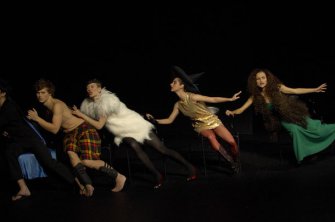Vera Mantero
Vera Mantero, coreografa, performer, cantante, artista visiva portoghese, è una delle figure più influenti della danza portoghese. Ha studiato danza classica e lavorato nel Balletto Gulbenkian di Lisbona. Dal 1987 ha iniziato a creare coreografie proprie portando i suoi lavori in Europa, Sudamerica, USA, Canada, Singapore e Corea del Sud. Tra questi, i soli Perhaps she could dance first and think afterwards (1991), Olympia (1993), one mysterious Thing, said e.e.cummings* (1996), e i lavori d'ensemble Under (1993), For Boring and Profound Sadnesses (1994), Poetry and Savagery (1998), Until the moment when God is destroyed by the extreme exercise of beauty (2006), We are going to miss everything we don’t need (2009), e i più recenti The Caldeirão highlanders, exercises in fictional anthropology (2012) e Maximum Wage (2014). Nel 2013 e 2014 ha realizzato le installazioni performative Shadows on offer per Lisbon On Sound, e More for Less than for More, a Lisbona, in collaborazione con Culturgest e il Teatro Municipale Maria Matos. Vera Mantero collabora regolarmente a progetti internazionali di improvvisazione, con artisti e coreografi come Lisa Nelson, Mark Tompkins, Meg Stuart e Steve Paxton. Dal 2000 Vera Mantero si dedica anche al lavoro sulla voce interpretando il repertorio di diversi autori e come co-creatrice di progetti musicali sperimentali. Nel 1999 il Teatro Culturgest di Lisbona le ha dedicato la retrospettiva Mese di Marzo, Mese di Vera. L'opera Eating your heart out, creata in collaborazione con lo scultore Rui Chafes, ha rappresentato il Portogallo alla 26esima Biennale di San Paolo nel 2004. Vera Mantero ha ricevuto il Premio Almada (IPAE/Ministero della Cultura) e il prestigioso Gulbenkian Art Prize, in riconoscimento alla sua carriera come performer e coreografa.
Vera Mantero, choreographer, dancer, performer and singer, is one of the most influential figures of portuguese dance in the 90s and 2000s. She studied classical dance and worked in the Ballet Gulbenkian in Lisbon. In 1987 she started creating her own choreography, showing her work in theatres and festivals in Europe, Brazil, USA, Canada and Singapore. Among her choreographic work she points out her solos Perhaps she could dance first and think afterwards (1991), Olympia (1993) and one mysterious Thing, said e.e.cummings* (1996), What can be said about Pierre (2011), and her group pieces Under (1993), For Boring and Profound Sadnesses (1994), Poetry and Savagery (1998), Until the moment when God is destroyed by the extreme exercise of beauty (2006), We are going to miss everything we don’t need (2009), and more recently The Caldeirão highlanders, exercises in fictional anthropology (2012) and Maximum Wage (2014). In 2013 and 2014 she created the performance-installations Shadows on offer and More for Less than for More, the latter one in partnership with Culturgest and Maria Matos Municipal Theatre.Vera Mantero participates regularly in international improvisation projects alongside improvisers and choreographers as Lisa Nelson, Mark Tompkins, Meg Stuart and Steve Paxton. Since the year 2000 Vera Mantero is dedicating herself also to vocal work by singing the repertoire of several authors and co-creating experimental music projects. In 1999 the Theatre Culturgest in Lisbon organized one month retrospective of her work entitled Month of March, Month of Vera. She represented Portugal at the 26th Biennial of São Paulo 2004 with Eating your heart out, a work created in collaboration with the sculptor Rui Chafes. In 2002 Vera Mantero was awarded the Almada Prize (IPAE/Ministry of Culture) and in 2009 the prestigious Gulbenkian Art Prize for her career as a performer and choreographer.

